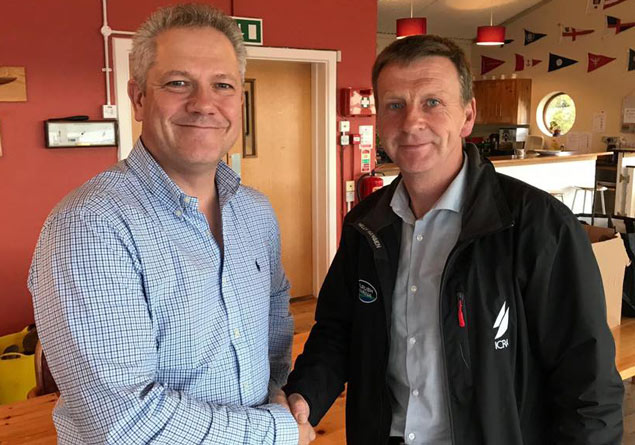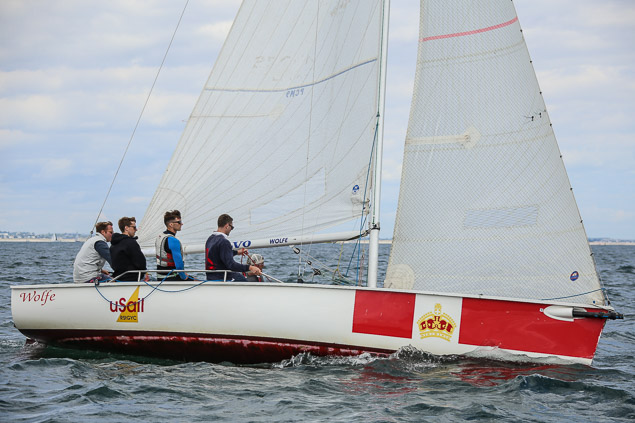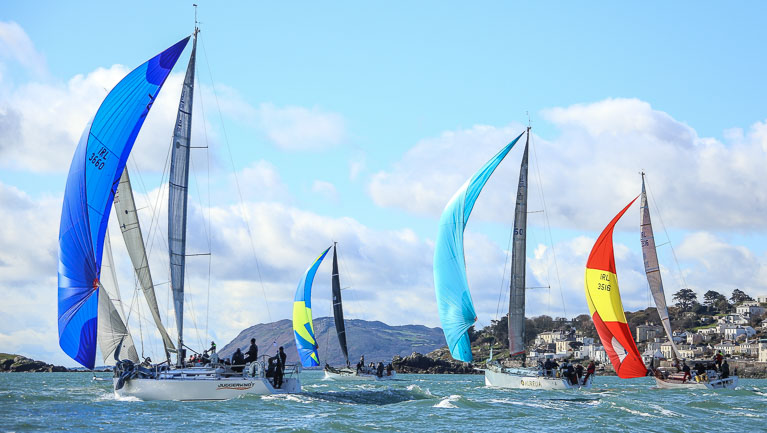An engaged group of 30 sailors or more gathered at Lough Derg Yacht Club on Saturday for ICRA's annual conference and agm that included a line up of talks as well as the presentation of the ICRA Boat of the Year Award, a sailors forum where discussion was heard about next year's national championships at the Royal St. George Yacht Club as well as ongoing refinements to ECHO handicaps. Below is a non-exhaustive overview of the day's proceedings under outgoing ICRA Commodore Simon McGibney.
 Richard Colwell, (left) of Howth Yacht Club was voted in as the new Commodore of Irish Cruiser Racing Association. He is pictured here without going Commodore Simon McGibney who retired after three years in he role. Photo: ICRA/Facebook
Richard Colwell, (left) of Howth Yacht Club was voted in as the new Commodore of Irish Cruiser Racing Association. He is pictured here without going Commodore Simon McGibney who retired after three years in he role. Photo: ICRA/Facebook
IRC & ICRA
Former RORC Commodore Michael Boyd, who was elected Chair of IRC Rating Congress last month, gave an excellent overview of where RORC is going. The London club is getting more involved with inshore thanks to the Royal Corinthian hook up and also working with ORC on the Worlds where a single Irish boat competed this year in The Hague. The combined World Championships was interesting and bought up a number of areas for further development. It remains unclear if IRC and ORC can ever merge but both are cooperating much better.
Boyd's overview presented IRC as an inclusive rule, with more emphasis on integrating different types of technology, versus the more traditional pure protection of the existing fleet.
Sails & Sailing
Prof O'Connell of North Sails Ireland gave an entertaining talk using highlights from the on the water sessions NS have done this year.
Graham Curran and Mark Mansfield of UK Sailmakers Ireland ran through some highlights from their Afloat.ie series this year (here), with a focus on setting up the boat and rig correctly.
Rory Carbery outlined the ongoing relationship between Irish Sailing and ICRA.
Strategic update
It was highlighted that the cruiser/racer fleet and the ICRA Nationals event contains a number of common designs. In future, ICRA to give these a focus and work with these owner groups to grow numbers and event attendance.
 The ICRA Nationals fleet features common designs including one designs such as J24s and 1720s Photo: Afloat.ie
The ICRA Nationals fleet features common designs including one designs such as J24s and 1720s Photo: Afloat.ie
Benchmarking against other class associations shows a number of areas where ICRA can improve: national series of events, technical support in terms of maintaining ECHO, common rules to help events run cruiser racing in compliance with the racing rules of sailing and that reflect the wishes of owners, better promotion of cruiser racing in Ireland
Howth Yacht Club's experience with under 25 sailors was highlighted as something that is working.
Pathways within cruiser racing ("how do ICRA create owners and keep them engaged") discussed. ICRA has initiatives for IS Training to Crew through the Under 25 effort and Competent Crew to Race Crew through the training grant. Other pathways for consideration include Friend Get Friend, Adult Training transition, engagement of Experience Seekers, Crew to Owner, White Sails to Spinnaker.
Under 25s update
There were six under 25 teams at this years J24 Nationals. Projects are going strong at HYC, RCYC and clubs in the west. At least one Dun Laoghaire club is looking to set up a team.
 A Royal St. George Yacht Club 1720 sportsboat is used to introduce sailors to keelboat racing Photo: Afloat.ie
A Royal St. George Yacht Club 1720 sportsboat is used to introduce sailors to keelboat racing Photo: Afloat.ie
Confirmed ICRAs commitment to encourage the development of Under 25 racing through:
- Grants to help under 25 teams take part in national events
- Looking into the potential for an under 25s nationals
Training grants
Successful events run nationally but ICRA can do more. There is budget available, come and get it. Should ICRA increase the limit? ICRA open to proposals about €1000 on a case by case basis.
Should ICRA provide training to boats without an ECHO/IRC cert? Possibly but this funding is coming from cert fees so that contribution needs to be recognised in terms fo where funding goes.
Offshore
Nearly all boats above 1.040 now focusing on coastal and offshore. This is not seen as a threat to ICRA, more people doing the cruiser racing that is right for them and offshore meets many of ICRA's objectives. ICRA to continue to work in collaboration on developing all parts of cruiser racing as a whole.
 Offshore sailing, such as ISORA racing above, is an important part of the Irish cruiser-racing scene Photo: Afloat.ie
Offshore sailing, such as ISORA racing above, is an important part of the Irish cruiser-racing scene Photo: Afloat.ie
Sailors forum
Sailors forum at the ICRA conference covered a range of topics and the following suggestions/observations were made.
The Boat of the Year (BoTY) Trophy should be changed to a points series based on existing national and regional cruiser racing events.
BoTY points to translate into penalties on Standard ECHO, to help ECHO address the issue ICRA is having at major events with ECHO and IRC prizes going to the same boat. More work is needed by ICRA to improve support for ECHO at a local level.
To give people more confidence in terms of who they will be racing against when entering an event ICRA will adopt a range of classes based on the design of cruiser/racer commonly sailed and narrow rating bands. Divisions will be formed for an event by combining these classes. Overall prizes will be awarded for the division. Day prizes will be awarded for each class.
The makeup of racing at the nationals was discussed. Should ICRA move to all windward/leeward with a single longer race making better use of the fixed marks available at most venues? It was felt that ICRA should stick with the current mix of laid windward/leeward and fixed mark courses as it offers the best opportunity for all boats to compete equally.
No crew weight limits to be continued.
Current no crew limits make people uncomfortable in the context of a nationals but reasons for doing this also recognised. New wording using the crew number on the cert but with no limits for crew under 18 and additional numbers if sailing with women to be drafted for further discussion.
Issues with group 3 limitations preventing participation thanks to the catch-all nature of WS regulations. WS looking at reducing the age to 22 and including anyone doing any coaching would make this worse. ICRA should trial no group 3 limits for IRC and a complete ban on group 3 for ECHO for next season and review.
Lifelines: ICRA should standardise on the OSR requirements
Equipment inspection: ICRA should introduce equipment inspection at the nationals.































































